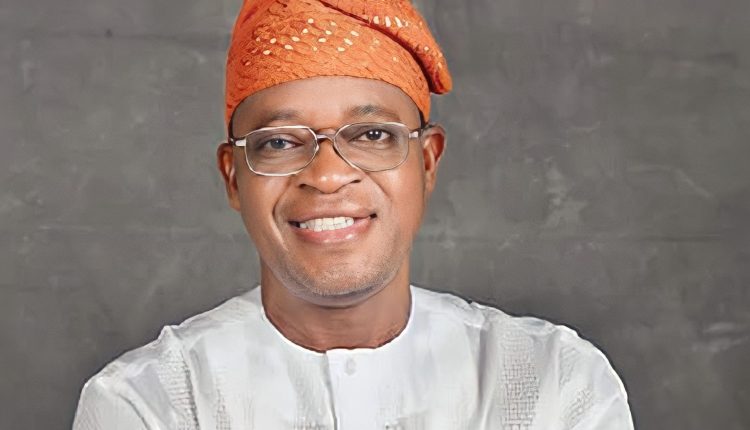FG considers CIF trade policy, eyes $10bn annual ship charter freight
….Mulls refloating national shipping line on PPP basis
Editor
Indication is rife that the Federal Government is set to consider jettisoning the age long economically senseless sale of Nigeria’s crude oil on Free on Board (FoB) bases, rather than on Cost, Insurance and Freight (CIF) bases which will create huge opportunity for local participation in the transportation of Nigeria’s export crude to the international market.
This came as came as the Minister of Marine and Blue Economy, Mr. Gboyega Oyetola also tinkering with the idea of re-establishment the National Shipping Line, but this time through a strategic Public Private Partnership (PPP) arrangement.
The Minister said this at an event in Lagos, on Tuesday.
According to him, the government thinking is borne out of the desire to capture a substantial share of the estimated $10 billion annual ship charter market within the country. At this event however, the Minister did not mention the issue of trade policy which will make it possible for the National Shipping Line and other local player to participate in the business without being out competed by the well established foreign liners.
Oyetola explained that the initiative would not seek to enhance the growth of local players but will further provide an avenue for them to create and extract more value from the sector, especially through ship building and repair.
This, the Minister said, would enable the local businesses to better leverage the Cabotage Act which gave Nigerians the exclusive right to control locally generated seaborne trade.
Hinting that the Federal Government could transform the Marine and Blue Economy sector through the innovative Public-Private Partnership (PPP) model which he said the ministry has embraced, Oyetola said, “This model, a collaborative synergy between the private sector’s efficiency and the public sector’s oversight, is set to bring about transformative impact on the marine and blue economy.
“Anticipated outcomes include the creation of substantial job opportunities and the facilitation of increased trade and investment in the nation, reinforcing our collaborative and forward-looking approach,” he said.
On the essence of the gathering, the Minister said, “that this Engagement Forum is crucial to the development of the sector as it offers an opportunity for us all to collectively contribute our perspectives, ideas and offer relevant inputs that can propel the sector to the trajectory of success necessary to support the development of the economy as well as meet the expectations of Mr. President who took the courage to open up Nigeria to focus on the Blue Economy Value Chain.
“The zeal for a better life for Nigerians propelled President Bola Ahmed Tinubu GCFR to recently unveil 8 Presidential Priorities to address critical national challenges. These priorities are to be delivered through 8 focus areas, namely: economic growth, food security, energy and natural resources, infrastructure development, security, healthcare, education, improved governance, and job creation.
“To actualise these Priorities, our Ministry has also moved a step further by putting up this Roundtable so that we can harvest ideas that would form part of our roadmap and policy direction. This is why today we will be looking at such areas like strengthening the Blue Governance; Transforming Port Operations; Enhancing Port Infrastructure; and Promoting Blue Economy Investments.
“This roadmap is designed in such a way as to enable our Ministry fulfil its mission of formulating and implementing policies, programmes and initiatives that will facilitate the development of an inclusive Marine and Blue Economy Ecosystem, driven by an operating environment that meets global best standards as well as fulfil its vision of positioning Nigeria as a premier Maritime Nation by utilizing the potential of its blue economy to diversify revenue, assure sustainable development and cultivate environmental stewardship.
“At this juncture, you will all agree with me that it is no longer business as usual, as there is an urgent need for a collaborative effort to brainstorm and devise strategies to leverage our marine resources for the betterment of the economy and safety of our planet. It is imperative we come up with practicable ways of ensuring that our Inland Rivers, Lakes and Waterways are well utilized for cargo shipment and passenger transportation.”
Aware that the sector is very vast with its unique challenges, the Minister, however, assured the stakeholders of his commitment to bequeathing to Nigerians a better sector than he had met it.
“Our Ministry though new, is not resting on its oars and has continued to foster Inter-Agency collaborations and implement initiatives to promote Port efficiency, cargo shipment, maritime security and tap into the resources of the seabed.
“Distinguished ladies and gentlemen, this Stakeholders’ Engagement will be the first in its series since it is important that we normalize this harmonious synergy and work together to ensure that our industry is safe, reliable and sustainable. I wish us all fruitful deliberations,” Oyetola said.


